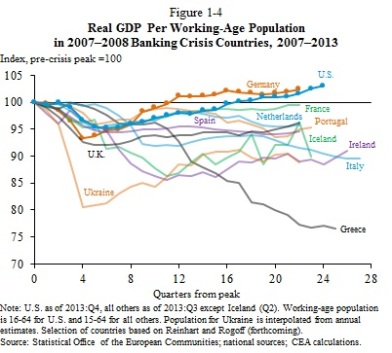Everyone’s expecting some fairly big fiscal stimulus bill to emerge early next year from Congress and to be signed by President Obama, but let’s not forget about what’s happening right now at the state level. Most states are constitutionally required either to pass a balanced budget or to have their governor submit one, so right now the talk in the statehouses, notably here in New York State where I live, is all austerity all the time.
Austerity budgets — draconian spending cuts, tax increases, or some combination thereof — are the last thing any economy needs during a recession. The backfiring “Hoover” tax increase of 1932 is forever held up as one of the Lessons From the Great Depression. Another lesson, familiar to economic historians though not so much the general public, is that the overall fiscal stimulus during the 1930s was actually quite small, as the New Deal deficits (which were actually not that huge in relation to the economy, as Paul Krugman reminds us) were largely offset by budget-balancing efforts at the state and local level. (The classic reference is E. Cary Brown’s “Fiscal Policy in the Thirties,” American Economic Review, 1956.)
This point about the government’s overall fiscal thrust might be even more important now than in the 1930s, when much if not most of the (partial) recovery of 1933-41 came from monetary expansion, mostly in the form of gold inflows from Europe. (Christina Romer, the incoming Chair of the Council of Economic Advisers, has an article about this, “What Ended the Great Depression?”, in The Journal of Economic History.) Right now, by contrast, the Fed is trying everything and then some, and doesn’t seem to be able to get the economy going again. So it may be up to fiscal policy.
Right now it seems to be mostly talk at the federal and state levels. The White House and Congress are in lame-duck mode, so nothing very concrete is being proposed. State legislatures are home for the holidays, and in states like mine where the governor has to submit a balanced budget but the state doesn’t have to pass one, there’s even less certainty. My take is that the federal stimulus package should not skimp on aid to state and local governments. For all the dysfunction of some state governments (like my own), their budgets reflect the needs and priorities of their people to at least some degree, and ignoring them just seems like bad policy. (I remember, when Clinton was getting started in 1993 and talking about an economic stimulus plan, hearing David Gergen deride the new president’s planned aid to state and local governments as “walking-around money for mayors.” I’m sure those kinds of dismissals will be common in the halls of Congress in 2009.)
My nightmare is that Congress passes a “Washington Knows Best” stimulus package that mostly stiffs the states and instead puts the funds into projects of its own choosing. Thousands of Bridges to Nowhere, and fifty state governments in distress. If that happens, the recession could be a long one, and could feel like a depression for anyone who works for a state or municipal government.

